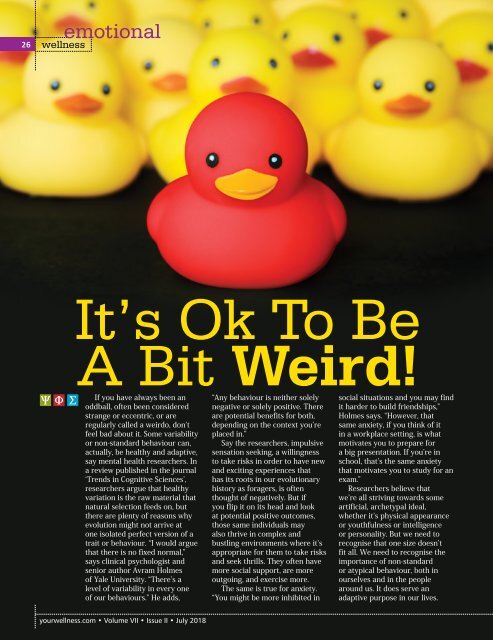New India_Assurance_ISSUE_July-2018
You also want an ePaper? Increase the reach of your titles
YUMPU automatically turns print PDFs into web optimized ePapers that Google loves.
emotional<br />
26 wellness<br />
It’s Ok To Be<br />
A Bit Weird!<br />
If you have always been an<br />
oddball, often been considered<br />
strange or eccentric, or are<br />
regularly called a weirdo, don’t<br />
feel bad about it. Some variability<br />
or non-standard behaviour can,<br />
actually, be healthy and adaptive,<br />
say mental health researchers. In<br />
a review published in the journal<br />
‘Trends in Cognitive Sciences’,<br />
researchers argue that healthy<br />
variation is the raw material that<br />
natural selection feeds on, but<br />
there are plenty of reasons why<br />
evolution might not arrive at<br />
one isolated perfect version of a<br />
trait or behaviour. “I would argue<br />
that there is no fixed normal,”<br />
says clinical psychologist and<br />
senior author Avram Holmes<br />
of Yale University. “There’s a<br />
level of variability in every one<br />
of our behaviours.” He adds,<br />
“Any behaviour is neither solely<br />
negative or solely positive. There<br />
are potential benefits for both,<br />
depending on the context you’re<br />
placed in.”<br />
Say the researchers, impulsive<br />
sensation seeking, a willingness<br />
to take risks in order to have new<br />
and exciting experiences that<br />
has its roots in our evolutionary<br />
history as foragers, is often<br />
thought of negatively. But if<br />
you flip it on its head and look<br />
at potential positive outcomes,<br />
those same individuals may<br />
also thrive in complex and<br />
bustling environments where it’s<br />
appropriate for them to take risks<br />
and seek thrills. They often have<br />
more social support, are more<br />
outgoing, and exercise more.<br />
The same is true for anxiety.<br />
“You might be more inhibited in<br />
social situations and you may find<br />
it harder to build friendships,”<br />
Holmes says. “However, that<br />
same anxiety, if you think of it<br />
in a workplace setting, is what<br />
motivates you to prepare for<br />
a big presentation. If you’re in<br />
school, that’s the same anxiety<br />
that motivates you to study for an<br />
exam.”<br />
Researchers believe that<br />
we’re all striving towards some<br />
artificial, archetypal ideal,<br />
whether it’s physical appearance<br />
or youthfulness or intelligence<br />
or personality. But we need to<br />
recognise that one size doesn’t<br />
fit all. We need to recognise the<br />
importance of non-standard<br />
or atypical behaviour, both in<br />
ourselves and in the people<br />
around us. It does serve an<br />
adaptive purpose in our lives.<br />
yourwellness.com • Volume VII • Issue II • <strong>July</strong> <strong>2018</strong>

















